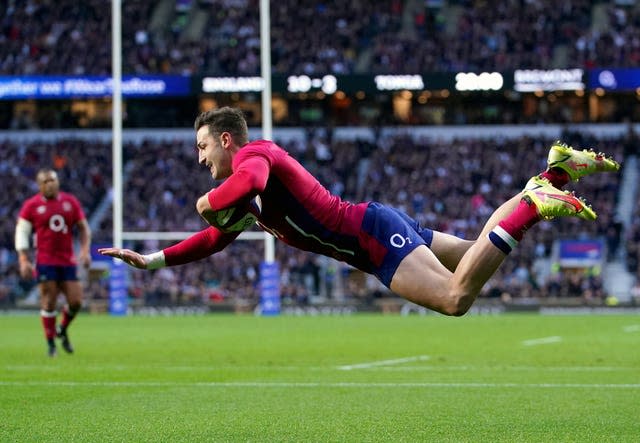Jonny May: Being uncomfortable is ‘price I’m willing to pay’ for special moments
Jonny May fears the all-consuming commitment to training that has shaped him into one of England’s greatest wings could lead to burnout.
May continued to chase down Rory Underwood’s record as the nation’s leading try-scorer by crossing twice in Saturday’s 69-3 victory over Tonga and it is the thrill of occasions such as an autumn Test at Twickenham that has inspired an agreement made with himself.
A 31-year-old described by Eddie Jones as the most professional player he has ever encountered is known for an extraordinary level of dedication to preparation that is held up as an example to any newcomers to the squad.
May wears this single-minded approach like armour, drawing strength from knowing he has done everything possible to be ready for matchday, but it also comes at a price that he is willing to pay.
Incredible to have a full house back at Twickenham yesterday ✨Thank you for your support 🌹🏴 pic.twitter.com/TpYXjjjB6r
— Jonny May (@J0nnyMay) November 7, 2021
“I call it my loop because it doesn’t stop. It’s the little extras that keep me resilient,” May told the PA news agency.
“It’s the boring stuff, it’s the loading the dishwasher, the chores of rugby that I probably am just quite good at.
Watch: Lower body workout
“Probably where my head is on a spectrum, I’m very good at repeating, repeating every single day those nibbly bits.
“That’s something I’ve always been able to do and it’s been trained to the point now that I really don’t know what else to do with myself.
“If I have a day off I can’t do nothing. At the forefront of my mind every day is ‘What do I need to be doing now?’.

“The nature of this mindset is that I could burn out with it, I’m fully aware of that. Is it sustainable? Can I hang on? Can I keep going with it? I don’t know. It’s burnout in terms of the demands I put on myself and the pressure I put myself under.
“The process I have to go through to get ready for a game is taxing and a double-edged sword. So I have to find the balance.
“I can’t burn out or put myself under too much pressure or get to a point where I can’t keep doing it.
“That’s the risk I run dong it the way I do it, but I want to keep fighting for it as long as I can and I am comfortable being uncomfortable.
“In fact, I don’t even know how to be comfy any more. I’m getting better at accepting that. That’s the price I’m willing to pay for special moments like the weekend. It’s a bargain that I’ve made with myself. For now I’ll keep going for as long as I can.”
Our squad for next week's match against Australia in the @autumnnations 👇#ENGvAUS
— England Rugby (@EnglandRugby) November 7, 2021
Beyond ensuring he is ready for Tests such as Saturday’s collision with Australia, May’s ceaseless treadmill of microdosing extra conditioning – stretching, loading specific muscle groups, plyometrics, ice baths, saunas – has developed an extensive bank of knowledge that could provide the foundations for a career when playing is no longer viable.
“I might be sick of rugby and will probably want a complete break and rest, but I’m good at the puzzle of performance, working out what’s needed, where it’s needed, how can you improve,” May said.
Watch: Core workout
“The medical and strength conditioning are parts of a puzzle for the body and for the athlete. I feel like I have a good understanding of that and have the mind for performance, but whether I want to go into that is another question.
“I’d be happy to go back to school and learn, but I’ve already picked up a lot of knowledge from my own experience after working in this elite environment for quite a long time.”
Even an enjoyable distraction away from rugby offers parallels for events on the pitch as May battles Manu Tuilagi at chess.
Since gathering for the Autumn Nations Series, Tuilagi has built a five-and-a-half to two-and-a-half lead after maturing from pupil to master.

May said: “Me and Manu go at it. At the World Cup I was teaching him but he’s gone away and played a lot of chess.
“I’m very much a rugby player first and spend a lot of time doing that, Manu will say it himself – he’s a barista, a snooker player, a carpenter and a chess player, and then a rugby player!
“We’ve had some good games. At the moment I call him Bobby Fischer. He calls me Bobby Fischer as well. He’s the grandmaster at the moment.
“I draw a lot of similarities between rugby and chess. Chess players aren’t necessarily thinking moves ahead, it’s about pattern recognition.
“It’s like the backfield in rugby, if the ball is there where will it go in the backfield next? That’s why I love chess. It’s through pattern recognition that you can anticipate what happens next.”

 Yahoo Sport
Yahoo Sport 





































